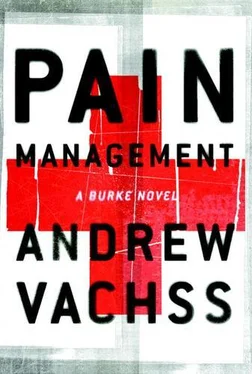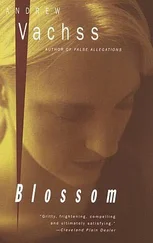“Is that a rare-book store?” I asked Ann, examining my prize on the front seat of her Subaru.
“Not especially. They have some hard-to-get stuff there, but it’s not exactly antiquarian.”
“This one cost five bucks new. And it’s ten years old.”
“What’s your point?”
“Twenty bucks seemed a little steep.”
“They work on a sliding scale there. Kids pay whatever they can afford, like on the honor system. When . . . someone your age comes in, they try to get whatever the traffic will bear.”
“And that keeps . . . people my age out of there for the most part.”
“That, too,” she said, smiling. “Is the book going to help you?”
“I don’t know yet.”
“All right. You know where to find me.”
“That’s it? That’s all you got?”
“No, Mr. . . . Hazard, that’s what you call yourself, yes? . . . I’ve got a lot more. But you might as well see what this is worth first.”
“Fair enough. Whatever’s in this book, it might give me a clue or two, but it isn’t worth—”
“Here you are,” she said, as she slid the Subaru alongside where I’d left my car. “Things don’t have ‘worth.’ That’s a nonsense concept. Things are worth what people are willing to pay for them. You think a hit of street heroin is ‘worth’ what they’re getting for it?”
“That again.”
“Yes. That again. I told you—”
“Thanks for the book,” I interrupted. “I’ll let you know.”
As I was climbing out of the car, she said, “Madison might be a lot more willing to talk to you if she thought you and I were working together . . . ,” letting the words trail out behind her as she pulled away.
“What is that you are reading?” Gem asked me that night.
I held up the paperback so she could see the cover. “It’s a book about kids. Runaways. And this place called Bordertown that they all run to. It’s a place that runs on music and magic.”
“A fantasy?”
“More like a fable. About the kind of community kids wanted to build in the Haight-Ashbury days. Maybe the kind of community they saw in their heads if they dropped enough acid, I don’t know. It’s not one of those post-apocalyptic jobs—this is kind of a parallel universe. I mean, this Borderland, it’s not perfect. There’s a kind of racism—or species-ism, maybe—there’s two different species, and a third that comes from mixing. People have to have jobs or they have to scrounge. There’s a goods-and-services economy, just like here. But the kids are building something out of their own needs. Something real different from what’s out here for them now.”
“Why is this important?” Gem had been a child in a place where dreams kill as surely as bullets, only with a lot more pain.
“The note . . . the one Rosebud left. It said she was going to find ‘the Borderlands.’ Not Border town, like in this book. And not Borderland, singular. It says here there was a book of that title, by these same people. I think it means she’s looking for this kind of life. And there’s another connect, too. The crow girls . . . in that picture on her wall . . . they’re from a Charles de Lint book. And Charles de Lint, he’s one of the writers—I guess maybe one of the architects—of this Borderland thing. At first I thought the crow girls were supposed to be Rosebud and Daisy, but after I read it a couple of times, I don’t think so.”
Gem let her impassive face ask the question for her.
“The crow girls are . . . contemporaries. Not just sisters. They’re about the same age. Different personalities, but . . . a lot alike.”
“Who do you think the other one is, then?”
“I’m going to try and find out. Maybe tomorrow.”
“Your daughter lent me a book,” I told the psychologist on the phone that night. “I’d like to come by and return it.”
“You mean you want to talk with her again.”
“Yes, sir.”
He covered the mouthpiece with his hand, but I could still hear him yelling for his daughter. A few minutes passed. No music-on-hold.
“It’s too late tonight,” he said when he got back on. “Come tomorrow. Seven-thirty.”
“Thank you.”
“Mr. Hazard?”
“Yes?”
“Come alone.”
“Sure.”
“Alone,” he repeated. “That means by yourself. Unarmed. With no recording devices. Do you understand?”
“Completely.”
He hung up on me.
“You know what would be exciting?” Gem whispered to me around midnight.
“What?”
“To suck your cock while you read those books.”
“Why would that be so—?”
“Just read your books,” she said softly. “Keep reading them.”
I showered and shaved, put on a chambray shirt with a plain black knit tie under a cream-colored leather jacket. Looked at myself in the mirror and realized it was all for nothing—dressing me up was like tying a red ribbon around the handle of an ice pick.
As soon as I pulled into their driveway, I stashed the Beretta and its holster under the front seat. I even unclipped my carbon-black Böker sleeve-knife and left it on the dash.
The father-and-son tag team greeted me at the door. The father’s gaze was professionally flat. The son was having a little trouble with hostility management.
“Thank you for having me,” I said formally.
“You’re not a guest,” the kid said.
“Michael . . .” his father muttered, moving his arm to the side to show me where he wanted me to go.
We all sat down. “We’re not a family with secrets,” the man said. “But that doesn’t mean we’re a family without privacy. Do you understand?”
“I . . . think so. Whatever I say to Jennifer, it’s between her and me?”
“Up to a point,” he warned. “I promise you, Jenn’s a very smart young woman. She doesn’t have to tell me anything, but she’s free to, got it?”
“Yes.”
“Then I’ll get her,” he said, getting up.
“You play ball?” I asked the son, looking for an opening.
“You mean like football?”
“No. I mean . . . you look like an athlete to me; I was just making conversation.”
“You didn’t come here to talk to me.”
“Not specifically. But you seem to have some . . . negative feelings about me. And I thought, if we talked, maybe I could find out why.”
“So why didn’t you just ask me, straight out?”
“Because I’m an idiot,” I told him. “I should have seen you’re the kind of man that appreciates a direct approach.”
A grin flashed across his face. “My dad’s an athlete,” he said. “He was a wrestler.”
“He looks it.”
“Yeah. Now he plays basketball to keep in shape. From what the guys he plays with say, though, he’s still a wrestler.”
I chuckled at that, envious of the man who had such a son.
“Michael mention soccer to you?” his father said, coming back into the room.
“Not a word. You play that, too?”
“Me? Huh! Michael’s all-state. Striker. Tournament MVP in the—”
“Pop!” the kid protested.
“He’s got about a hundred scholarship offers,” his sister added, beaming at him.
“Aaargh!” the kid grunted, his face flaming.
Father and daughter sat down together. My envy went up another notch.
“Dad says you want to talk to me?” Jennifer said.
“That, and to return the book you lent me.”
“Thank you,” she said, taking the book I handed her. “Well?”
“I thought you’d rather . . .”
“I want my father to be here, this time,” she said firmly.
Michael shifted his stance, making it clear I’d have to deal with all of them.
Читать дальше











